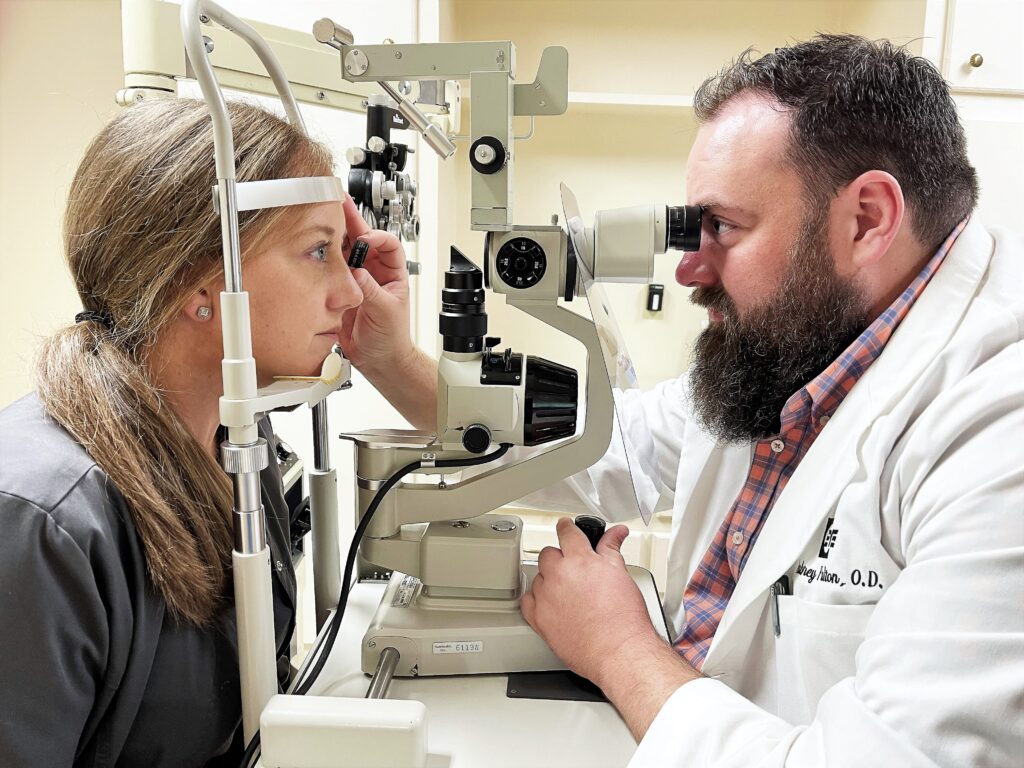
What 4 Eye Diseases Should You Keep Watch for After 40?
It’s a fact of life: health issues tend to increase as you age. Your eyes aren’t exempt either.
“Our risk for eye diseases increases as we get older,” says Dr. Aubrey Fulton, a Therapeutic Certified Optometrist with Hattiesburg Eye Clinic. “This is often due to the rest of our health—what affects the body may affect the eyes.”
Of the many eye issues that may arise due to aging, Dr. Fulton says there are 4 in particular that should be of special concern to older adults. Collectively, they represent not only the majority of cases of visual impairment in people over forty, but also of blindness.
Cataracts
This gradual clouding of the natural eye lens results in blurriness or color fading, and could eventually result in blindness. “Early on, we can compensate with stronger prescription eyewear,” says Dr. Fulton. “Eventually, though, this and other measures won’t be enough.”

Fortunately, cataract surgery can reverse the trend permanently. After the clouded lens is removed (often with a laser such as Hattiesburg Eye’s CATALYS® system), the surgeon inserts an artificial implant (IOL) into the eye. Afterward, the patient’s vision returns to what it was before the cataract—or be even better.
Glaucoma
Glaucoma has a well-earned reputation for “stealthiness.” It occurs when the natural fluid in the eye remains too high, usually because the fluid can’t drain properly. Because it occurs slowly—often over decades—and rarely has early symptoms, many patients don’t even realize they have the disease before their optic nerves have been permanently damaged. Without intervention, blindness is too often the end result.
Although no effective cure exists for glaucoma, Dr. Fulton says the disease can be managed long-term. “Most patients can use daily eye drops to keep their pressure normal. More serious cases may require surgery or other advanced techniques to improve drainage.”
The key, according to Dr. Fulton, is to identify elevated eye pressure early with a routine eye exam. The sooner drops or other measures can be implemented to normalize eye pressure, the better a patient’s chances of avoiding blindness
Macular Degeneration
Prominent in people over 50, this disease targets the macula, a part of the retina that processes light in the center of a person’s vision. Dry MD, the most common form, causes gradual deterioration of cells in the macula; a small percentage of these cases may then develop into Wet MD, in which blood vessels in the macula leak or rupture.
“Patients may start noticing blurriness or blank spots in the center of their vision,” says Dr. Fulton. “This worsens with time, although Wet MD may happen very rapidly. And any damage is irreversible.”
Early-stage patients often benefit from vitamin supplement therapy, enhanced UV ray protection, and avoidance of tobacco smoking. Patients with advanced cases may require injections that limit fluid leakage.
Diabetic Retinopathy
Nearly 30% of people over 65 have diabetes, a metabolic disease in which sugar glucose levels in the bloodstream remain abnormally high. Besides serious consequences to other aspects of a patient’s health, diabetes can also damage the eyes.
“Diabetes affects the smallest blood vessels first,” says Dr. Fulton. “Because the eyes depend on these smaller vessels to remain healthy, any damage to them can be a serious matter.” Such is the case with diabetic retinopathy in which blood vessels in the retina weaken or grow abnormally, potentially damaging the retina in the process.
If it progresses, a patient may need laser treatment or retinal injections to limit the damage. Patients can also help protect their eyesight by keeping their diabetes under control with diet, exercise, and medication.
Besides maintaining a healthy lifestyle, the most important thing you can do to stay ahead of these and other eye diseases is to undergo an annual eye exam after age 40 (or earlier if you have a family history of disease or have diabetes). Early detection for any disease can go a long way toward protecting your eyesight long-term.
To learn more about senior vision care at Hattiesburg Eye Clinic, be sure to visit our website. To find out how Hattiesburg Eye Clinic can improve your vision health, call 601-268-5910 (or toll-free 800-624- 8254) or schedule a consultation with us at www.hattiesburgeyeclinic.com/contact-us/
